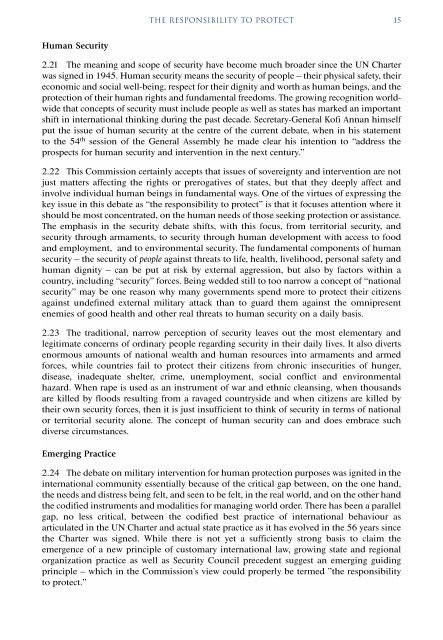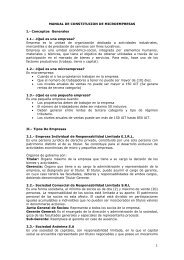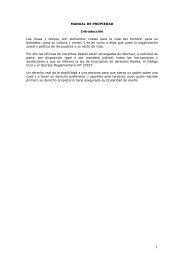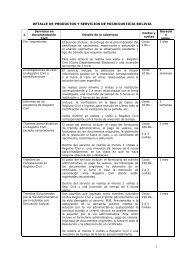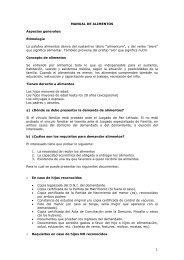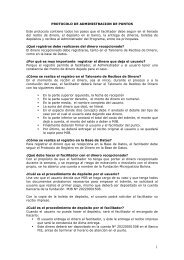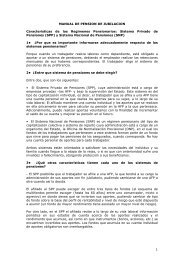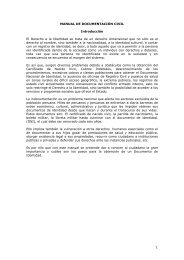ICISS report - International Coalition for the Responsibility to Protect
ICISS report - International Coalition for the Responsibility to Protect
ICISS report - International Coalition for the Responsibility to Protect
You also want an ePaper? Increase the reach of your titles
YUMPU automatically turns print PDFs into web optimized ePapers that Google loves.
The <strong>Responsibility</strong> <strong>to</strong> <strong>Protect</strong> 15<br />
Human Security<br />
2.21 The meaning and scope of security have become much broader since <strong>the</strong> UN Charter<br />
was signed in 1945. Human security means <strong>the</strong> security of people – <strong>the</strong>ir physical safety, <strong>the</strong>ir<br />
economic and social well-being, respect <strong>for</strong> <strong>the</strong>ir dignity and worth as human beings, and <strong>the</strong><br />
protection of <strong>the</strong>ir human rights and fundamental freedoms. The growing recognition worldwide<br />
that concepts of security must include people as well as states has marked an important<br />
shift in international thinking during <strong>the</strong> past decade. Secretary-General Kofi Annan himself<br />
put <strong>the</strong> issue of human security at <strong>the</strong> centre of <strong>the</strong> current debate, when in his statement<br />
<strong>to</strong> <strong>the</strong> 54 th session of <strong>the</strong> General Assembly he made clear his intention <strong>to</strong> “address <strong>the</strong><br />
prospects <strong>for</strong> human security and intervention in <strong>the</strong> next century.”<br />
2.22 This Commission certainly accepts that issues of sovereignty and intervention are not<br />
just matters affecting <strong>the</strong> rights or prerogatives of states, but that <strong>the</strong>y deeply affect and<br />
involve individual human beings in fundamental ways. One of <strong>the</strong> virtues of expressing <strong>the</strong><br />
key issue in this debate as “<strong>the</strong> responsibility <strong>to</strong> protect” is that it focuses attention where it<br />
should be most concentrated, on <strong>the</strong> human needs of those seeking protection or assistance.<br />
The emphasis in <strong>the</strong> security debate shifts, with this focus, from terri<strong>to</strong>rial security, and<br />
security through armaments, <strong>to</strong> security through human development with access <strong>to</strong> food<br />
and employment, and <strong>to</strong> environmental security. The fundamental components of human<br />
security – <strong>the</strong> security of people against threats <strong>to</strong> life, health, livelihood, personal safety and<br />
human dignity – can be put at risk by external aggression, but also by fac<strong>to</strong>rs within a<br />
country, including “security” <strong>for</strong>ces. Being wedded still <strong>to</strong> <strong>to</strong>o narrow a concept of “national<br />
security” may be one reason why many governments spend more <strong>to</strong> protect <strong>the</strong>ir citizens<br />
against undefined external military attack than <strong>to</strong> guard <strong>the</strong>m against <strong>the</strong> omnipresent<br />
enemies of good health and o<strong>the</strong>r real threats <strong>to</strong> human security on a daily basis.<br />
2.23 The traditional, narrow perception of security leaves out <strong>the</strong> most elementary and<br />
legitimate concerns of ordinary people regarding security in <strong>the</strong>ir daily lives. It also diverts<br />
enormous amounts of national wealth and human resources in<strong>to</strong> armaments and armed<br />
<strong>for</strong>ces, while countries fail <strong>to</strong> protect <strong>the</strong>ir citizens from chronic insecurities of hunger,<br />
disease, inadequate shelter, crime, unemployment, social conflict and environmental<br />
hazard. When rape is used as an instrument of war and ethnic cleansing, when thousands<br />
are killed by floods resulting from a ravaged countryside and when citizens are killed by<br />
<strong>the</strong>ir own security <strong>for</strong>ces, <strong>the</strong>n it is just insufficient <strong>to</strong> think of security in terms of national<br />
or terri<strong>to</strong>rial security alone. The concept of human security can and does embrace such<br />
diverse circumstances.<br />
Emerging Practice<br />
2.24 The debate on military intervention <strong>for</strong> human protection purposes was ignited in <strong>the</strong><br />
international community essentially because of <strong>the</strong> critical gap between, on <strong>the</strong> one hand,<br />
<strong>the</strong> needs and distress being felt, and seen <strong>to</strong> be felt, in <strong>the</strong> real world, and on <strong>the</strong> o<strong>the</strong>r hand<br />
<strong>the</strong> codified instruments and modalities <strong>for</strong> managing world order. There has been a parallel<br />
gap, no less critical, between <strong>the</strong> codified best practice of international behaviour as<br />
articulated in <strong>the</strong> UN Charter and actual state practice as it has evolved in <strong>the</strong> 56 years since<br />
<strong>the</strong> Charter was signed. While <strong>the</strong>re is not yet a sufficiently strong basis <strong>to</strong> claim <strong>the</strong><br />
emergence of a new principle of cus<strong>to</strong>mary international law, growing state and regional<br />
organization practice as well as Security Council precedent suggest an emerging guiding<br />
principle – which in <strong>the</strong> Commission’s view could properly be termed ”<strong>the</strong> responsibility<br />
<strong>to</strong> protect.”


